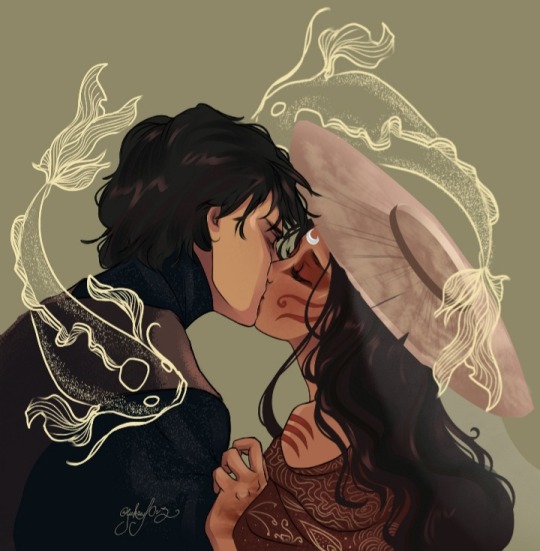Text
What a damn good power couple.


Art by @zarory, also on Instagram!
https://instagram.com/zarory_ch?igshid=YmMyMTA2M2Y=
4K notes
·
View notes
Text

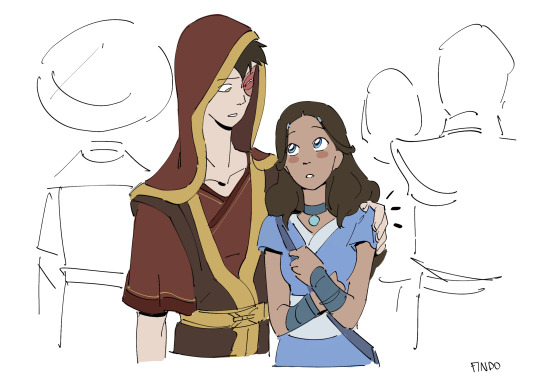
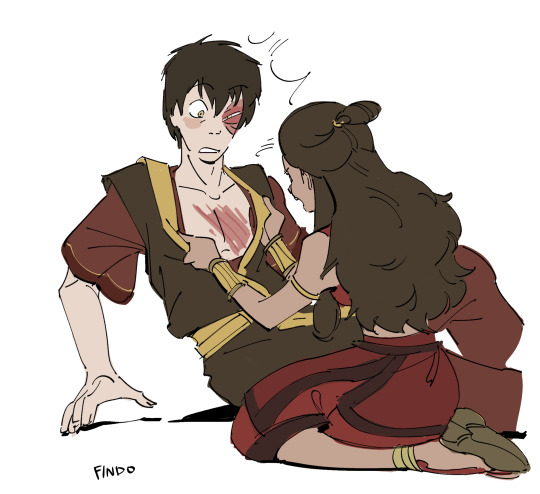

Zuko and Katara art by FINDO @findoland on Twitter (1 / 2 / 3 / 4)
2K notes
·
View notes
Text
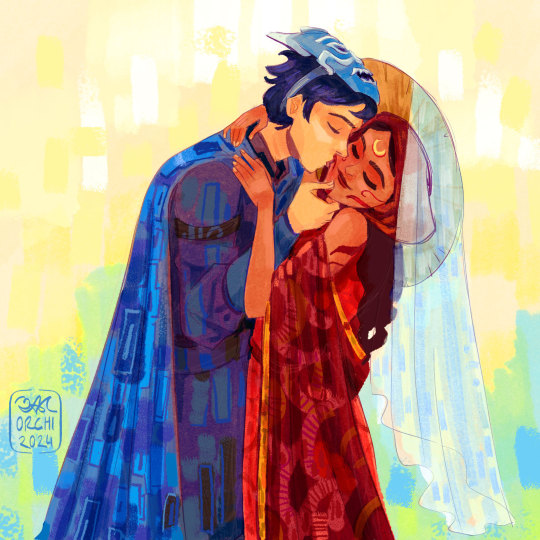
Back to my brief Zutara phase
6K notes
·
View notes
Text
You want to know why Inigo Montoya remains such an iconic and beloved character even 35 years after the Princess Bride came out?
It’s because he’s one of the few characters in fiction who has a story where he has dedicated his life to revenge, his whole motivation is about getting revenge….and he gets it! and then he isn’t empty or despairing! he doesn’t regret it! he’s totally satisfied!
because so many stories about revenge or rage are about characters “seeing the futility of their actions” or learning “their desire for revenge has only made them the monsters they hated” FUCK THAT.
Inigo Montoya kills the man who kills his father, is allowed to live in the narrative after and be happy about it and it is so satisfying. it’s fantastic. it’s iconic.
let more characters rage against the world, bring it down with bloodied hands, and let them be FUCKING RIGHT about it. Let them celebrate their success with sharp grins, and let them live happy, full lives where they always remain proud/fulfilled for what they’ve done
72K notes
·
View notes
Text
i will always hate that katara never came to terms with her bloodbending. especially given that it’s a symbolic representation of her own “darker” side, the fact that she was never able to find the good in it and accept it as just another aspect of her element, instead outlawing and demonizing it forever, makes me so sad because it perfectly encapsulates the person she herself ended up as: the shallow, shining trophy wife on aang’s arm, locking away everything he didn’t want and was never able to understand to become his perfect, flawless forever girl for the rest of her days.
and it’s so much more frustrating knowing that zuko — who knows exactly what it feels like to wield an element that can be destructive and violent, whose own arc about the duality of fire would have made him the perfect person to help katara understand that there is no such thing as inherently good or evil bending, only the bender who makes it so — was right there! yet instead of letting them have even one conversation about it, we got bloodbending being villainized till the heat death of the fucking universe and katara left forever unable to accept the complexity of her bending (and metaphorically, the complexity within herself) even though she had the exact person she needed right at hand to help and support her through the process… god it just drives me mad
2K notes
·
View notes
Text
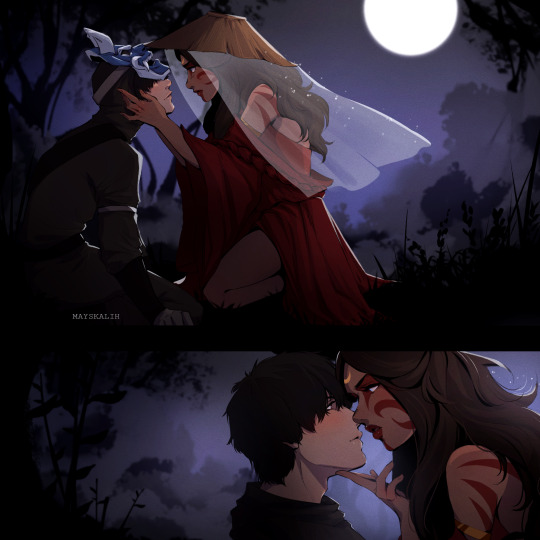
the night they pretended they didn't know the face behind the mask.
7K notes
·
View notes
Text
I just watched Avatar for the first time all the way through, and yeah, it’s great, but the one thing that surprised me was how different Katara was compared to the fandom interpretation I’d seen and internalized before watching.
Like, before you watch Avatar, you’ve seen all these memes about Katara and her mom, and based on those memes, you assume it’s one of those lines you have to get used to hearing at least once every episode. But then you watch the show and realize that she only talks about her mom maybe five or six times per season and you also realize she only brings her up when she’s trying to comfort someone or empathize with them because that’s how she processes her grief and that’s one way she connects with people.
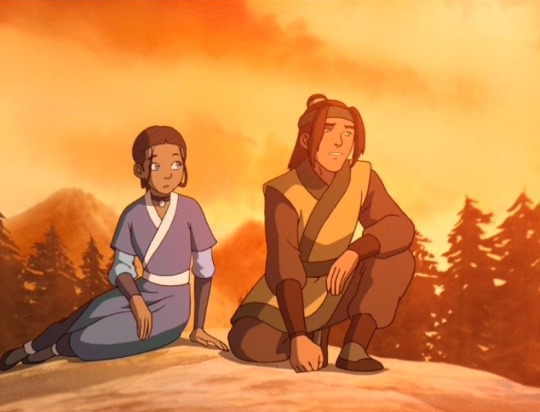
Or you hear the infamous line, “then you didn’t love [our mother] the way I did” and you prepare yourself for one of the worst character assassinations ever only to see the scene after nearly three seasons worth of context and realize she was kinda right. She’s been the mother, the nurturer, the comforter. She’s been patient, gentle, and accommodating where everyone else has gotten to be insensible and reckless and childish, and the one moment where she allows herself to feel her grief, suddenly she’s this evil bitch and not, y’know, a 14 year old girl whose been thrusted into adulthood in a way no other character has. A 14 year old girl who should be allowed immaturity and raw emotion and anger instead of the patience and grace she’s been forced to extend to every character without even the smallest amount of gratitude or even consideration in return.
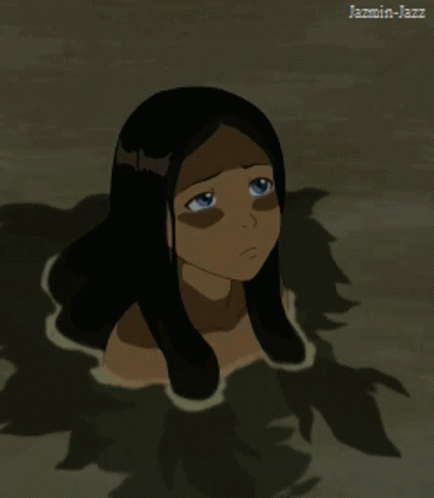
Or you see all of the clips where Katara puts Aang in the “friendzone” and you expect to have this wishy washy back and forth where Aang is putting his feelings out there only to have Katara neither commit nor express any clear reciprocation or rejection. Then you watch and realize that, as cute as the ship is initially, that there’s never a point where Aang returns any comfort or grace to Katara despite her always doing this for him to the point of coddling. That for as much as Aang says he loves her, he never seems to outgrow his perception of her so he can recognize her as someone who feels grief, anger, and pain as much as she expresses love, kindness, and maturity. And instead of having moments where he learns to see her beyond her strength or compassion, you’re instead given moments where Aang forces his feelings onto her, both romantic and non-romantic, and Katara is expected to just…shoulder those feelings the way she shoulders everyone else’s.
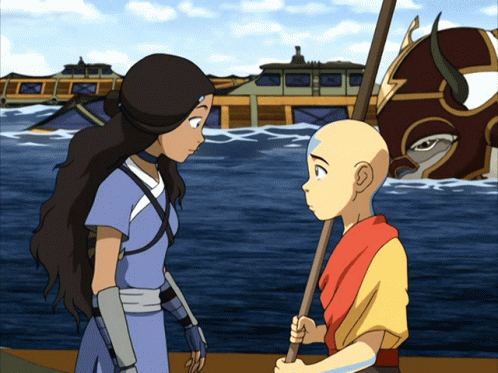
Katara is the most misunderstood character in the show. As much as people recognize the complexities of Zuko, Sokka, and Azula, they struggle to do the same for Katara because they see her struggles as somehow lesser, and therefore, less deserving of sympathy. They can handle her so long as she’s being endlessly patient and loving and kind, but the moment her endless love, patience, and kindness runs out, she’s suddenly this annoying bitch who can’t shut up about her mother or reciprocate Aang’s feelings. But Katara’s trauma does matter as much as anyone else’s. No, she wasn’t banished from her kingdom. No, she didn’t lose her entire community, and no, she isn’t the only one who lost her mother. But the difference between her and everyone else whose experienced loss because of the Fire Nation is that she’s never given time to process her trauma. Aang gets to lean on Katara constantly. Toph gets to express her feelings to Katara, and yeah, Sokka also lost their mother, but unlike Katara, he isn’t put in the position of being a substitute for everyone’s parent. He even admits that he sees his sister as a mother. The only characters who ever comfort Katara or allow her to vent is Zuko and her father and that’s, like, three scenes in a show where the other characters are consistently given opportunities to seek out Katara for unconditional support.
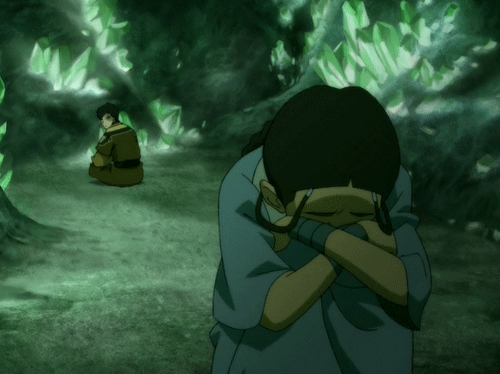
The fandom interpretation of Katara has been so bastardized that even those who haven’t watched the show know her for this fanon version and not for who she is. She’s such an interesting character beyond her fandom limitations, though. She’s brave, hot-headed, and hopeful as well as gentle and caring. She wishes to learn waterbending, not only because she wants to fight in the war, but because she wants to continue her culture’s practices because, and people often forget this, she also lost an entire subculture within her already fractured tribe. And she wants to defeat the Fire Nation both because of her deep love and empathy for other people, but also because she wants to avenge her mother. But because some of the fans have reduced Katara to a bitch who constantly whines about her mother and friendzones Aang, you wouldn’t know any of this, and it sucks because she’s the only character whose been dumbed down to such an extent.
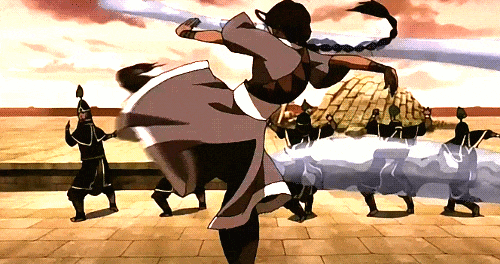
23K notes
·
View notes
Text
Why I feel like Ka/taang is one-sided, despite textual evidence
ATLA does try to convince us that Katara has romantic feelings for Aang. For example: she seems thoughtful when she realizes that Aang is a powerful bender; she’s offended that he didn’t want to kiss her in the Cave of Two Lovers; she gets jealous when Sokka says On Ji and Aang look good together.
So…what’s wrong with anti-Kataangers? Do we just lack media comprehension?
To be clear, on their own, these gestures can indicate romantic interest. But at the same time, we have stuff like “Aang is a sweet little guy, like Momo.” We have her ambivalent facial expression after he kisses her before the eclipse, and her hedging during Ember Island Players, and her anger when he kisses her anyway. In the context of these conflicting cues, Katara’s possibly romantic reactions can absolutely be interpreted in a different way, because:
Acknowledging a friend as a potential romantic interest is not the same as actually being romantically interested in them. (Imo this is something young women struggle with, due to a combination of romance-centrism and heteronormativity that make women feel like they should be in romantic relationships, and that boys and girls who share intimate and deep feelings for one another must be romantically into each other)
Wanting someone to find you desirable is not the same as desiring that person. (Which is something a lot of women, especially young women, struggle with. Remember all the discourse around Cat Person back in 2017?)
Being jealous when someone flirts with your friend is not the same as wanting to be with your friend. (Especially when you see your friends as family, or if you’re accustomed to a specific type of devotion from that friend. It is jealousy, and it is possessiveness, but it doesn’t always arise from romantic feelings)
Growing up in a patriarchal society means that your desires are always filtered through what men want from you, sometimes in an abstract male gaze-y way, and sometimes in a very visceral and interpersonal way when a boy wants you specifically. And Katara’s reactions are just that — reactions. Reactions to what other people — including Aunt Wu, Sokka, Aang himself — have insinuated about her and Aang. She’s not really proactive in her interest in Aang: we don’t really see Aang, romantically, from Katara’s POV. Under the framework of “Katara is reacting to a romantic prospect she’s kind of uncertain about,” it is completely plausible — and indeed likely — that she would sometimes act in ways that indicate romantic interest, in addition to moments where she indicates the opposite.
Ka/taang shippers often bring up other evidence, like Katara’s despair when Azula hits Aang with lightning, or how protective she is of him when Zuko joins the Gaang. The thing is, these pieces of evidence aren’t necessarily indicative of romantic love. The fact that Katara genuinely loves Aang makes the whole thing more complicated, not less, because — especially at that age, especially when Aang is twelve years old and grew up in a sex-segregated society of monks — it is really difficult to tell the difference between platonic love and romantic love. Their mutual devotion is layered and complex yet straightforward in its sincerity. What was not straightforward, until the last five minutes of the show, is whether this devotion on Katara’s end is romantic. The romantic arc for Katara and Aang is not really an arc, as Sneezy discusses in this classic ZK video. Katara actually becomes more conflicted over time and we never see an event that clarifies her feelings. She seems more interested in him in The Headband than on the Day of the Black Sun, and she has never been more hostile to his romantic overtures than in the penultimate episode.
And in light of this, it’s pretty easy for fans to fill in the blanks with a different interpretation: maybe Katara’s weird expression after their kiss at the invasion means she didn’t enjoy it; maybe the kiss made her realize that she doesn’t actually feel that way about Aang; maybe against her will and her better judgement, she’s developing feelings for another person, a person who hurt her and whom she fervently tried to hate until he pulled off what is in my opinion the greatest grovel of all time in the form of a life-changing field trip. Maybe. Am I saying that Zutara has more romantic interactions than Ka/taang? Of course not. But ironically, the lack of romantic interactions means that it’s not inherently one-sided, the way Ka/taang became in the latter half of season 3.
I’m not arguing that Katara’s unequivocally not into Aang. Obviously the text declares that she is, because they get married and have kids. But I am saying that there’s a very good reason that so many people, especially women, see Katara’s interest in Aang as ambiguous. It’s not because we can’t pick up “subtle” hints of growing affection. It’s because we know not all affection is romantic, and it’s really easy for someone else’s insistent romantic intentions to muddle what you want.
P.S. I first started thinking about these topics (platonic vs romantic love, desiring someone vs wanting to be desired, etc) in the context of compulsory heterosexuality, a term describing how queer women contort themselves into relationships with men even if they’re not really into men. I saw a post a few days ago joking about why so many queer women seem to be into Zutara. I wonder if part of the reason is because as queer women, we are very sensitive to the ways in which we can talk ourselves into wanting things we don’t actually want, and Katara’s romantic interest in Aang can be easily seen that way.
392 notes
·
View notes
Text
The biggest casualties of the Netflix Avatar show are Katara and Iroh. I already talked about Iroh, so, Katara...
Spoilers below. And anger below. Lots of rage. Sorry, guys.
Katara's anger is gone. "NO WAY AM I APOLOGIZING TO A SOUR OLD MAN LIKE YOU! I'll be outside if you're man enough to fight me." is instead "no uh i wouldn't have accepted that if i knew, uh, you're afraid of what you might learn if you fought me :(" and it's so fucking disheartening to see a 2020s production that doesn't know how to show justified feminine rage. Which Katara has, and which she's FUCKING ICONIC for.
Netflix Katara is such a pushover. OG Katara is compassionate, kind, nurturing, and FUCKING FURIOUS. Her compassion and kindness have a deep backdrop of RAGE to them. The world isn't how Katara wants it to be? Katara will FIGHT THE WORLD, and meanwhile, the Gaang will EAT THEIR VEGETABLES.
Like. Fuck. In my last, longer post I tried to be, like, fairly even and shit and channel my inner reviewer, and in this post, I RAGE ABOUT THE CHARACTER ASSASSINATION OF KATARA. Katara is not a meek dishrag. Katara is a smothering rageball and Katara is a kind, even-tempered person. Katara is capable of putting aside her own needs ("you have to learn from master Pakku, even if he is a big jerk", because yes, saving the world is the biggest priority) and then absolutely demanding her worth ("YOU CAN'T KNOCK ME DOWN!").
Real angry about that, in case you couldn't tell. They might have just put a necklace on a wooden plank and written "GIRL" on it.
1K notes
·
View notes
Note
Hey, love your blog! Something doesn't sit right with me about Aang's attachment problem. Didn't he let go of Katara? We see him give her up and then gets shot by Azula. But he still opened it. If that's the case, why is Aang still attached to her? And why is he braver about it? (Asking her for a dance and kissing her twice, not that kissing her was a good thing). Did overcoming his attachment meant he saw her as more (romantically) approachable? But it's weird for him to overcome an attachment while in the next episodes he's more in love than ever. What do you think?
Yeah, the thing is, getting rid of his attachment should make him romantically braver and should ultimately make him closer to Katara. Because the problem with Aang's attachment was that it was an insecure attachment. Which is what made him act in ways that reflected that insecurity, like being anxious that Katara would not reciprocate his feelings. This actually hindered his relationship with Katara in book one and two because it prevented him from being honest about his feelings with Katara for fear that she might reject him. (Remember the whole "I'd rather kiss you than die" debacle?) This insecurity about losing her is also why he imagined her in peril when the guru asked him to let his attachment go.
And no way, no way is Aang going to get over that insecure attachment in a moment when Katara is in dire danger, in the heat of battle, when he couldn't do it before when he was with the guru and we're explicitly shown that the thought of Katara in danger is what is keeping Aang tethered to that insecure attachment. It's just not possible. I don't believe it.
What would have happened if Azula's lightning had not neutralized that conflict by making it irrelevant, is that realistically, after failing to save Katara and Ba Sing Se, Aang should be more insecurely attached to Katara than ever. And that is what happens. He acts more on his feelings but in ways that show that he's more afraid than ever that Katara will not reciprocate, and that then translates to entitlement towards her and anger at her in Ember Island Players for not reciprocating his affection.
So not only does it not make narrative sense for Aang to be able to open his chakra when he did, the narrative carries on as if he didn't and the excuse they use for why Aang can't is "because Azula shot him with lightning." The plotline about Aang forming a more secure attachment to Katara is completely dropped in favor of putting the onus on Katara to reciprocate Aang's feelings.
That's a large part of why book three feels like a mess. It actually would have been a compelling narrative if Aang HAD learned to be more secure in his attachment to Katara. Which should not mean he doesn't love her, it means he's secure enough to accept it if she says no. Which actually would make him braver romantically because he would not be afraid of rejection. So much of Katara and Aang's narrative feels like nice guy bullshit because the narrative blames Katara for not automatically returning Aang's love instead of having Aang pluck up the courage to actually ask her out. The reason so called "nice guys" always think that girls love jerks instead of them is that they don't realize that you actually have to ask a girl out to get her to be your girlfriend, instead of waiting for her to just fall into your lap because you're too terrified she will say no. And by the time Aang does make his intentions clear to Katara, it's "why aren't we together?" instead of actually asking her how she feels and what she wants.
And I've theorized that it actually was the original intention to have Aang go through a period of being more insecure in his relationship with Katara than ever before learning to be more secure in his relationship and thus unlocking the Avatar State, also rounding out the parallels between Aang and Zuko in book three, which also feel like missed opportunities that are never really followed through, most likely because the writers were either unwilling or unable to take the same risks with Aang's narrative as they did with Zuko's.
59 notes
·
View notes
Text
Katara's Story Is A Tragedy and It's Not An Accident
I was a teenaged girl when Avatar: The Last Airbender aired on Nickelodeon—the group that the show’s creators unintentionally hit while they were aiming for the younger, maler demographic. Nevermind that we’re the reason the show’s popularity caught fire and has endured for two decades; we weren’t the audience Mike and Bryan wanted. And by golly, were they going to make sure we knew it. They’ve been making sure we know it with every snide comment and addendum they’ve made to the story for the last twenty years.
For many of us girls who were raised in the nineties and aughts, Katara was a breath of fresh air—a rare opportunity in a media market saturated with boys having grand adventures to see a young woman having her own adventure and expressing the same fears and frustrations we were often made to feel.
We were told that we could be anything we wanted to be. That we were strong and smart and brimming with potential. That we were just as capable as the boys. That we were our brothers’ equals. But we were also told to wash dishes and fold laundry and tidy around the house while our brothers played outside. We were ignored when our male classmates picked teams for kickball and told to go play with the girls on the swings—the same girls we were taught to deride if we wanted to be taken seriously. We were lectured for the same immaturity that was expected of boys our same age and older, and we were told to do better while also being told, “Boys will be boys.” Despite all the platitudes about equality and power, we saw our mothers straining under the weight of carrying both full-time careers and unequally divided family responsibilities. We sensed that we were being groomed for the same future.
And we saw ourselves in Katara.
Katara begins as a parentified teenaged girl: forced to take on responsibility for the daily care of people around her—including male figures who are capable of looking after themselves but are allowed to be immature enough to foist such labor onto her. She does thankless work for people who take her contributions for granted. She’s belittled by people who love her, but don’t understand her. She’s isolated from the world and denied opportunities to improve her talents. She's told what emotions she's allowed to feel and when to feel them. In essence, she was living our real-world fear: being trapped in someone else’s narrow, stultifying definition of femininity and motherhood.
Then we watched Katara go through an incredible journey of self-determination and empowerment. Katara goes from being a powerless, fearful victim to being a protector, healer, advocate, and liberator to others who can’t do those things for themselves (a much truer and more fulfilling definition of nurturing and motherhood). It’s necessary in Katara’s growth cycle that she does this for others first because that is the realm she knows. She is given increasingly significant opportunities to speak up and fight on behalf of others, and that allows her to build those advocacy muscles gradually. But she still holds back her own emotional pain because everyone that she attempts to express such things to proves they either don't want to deal with it or they only want to manipulate her feelings for their own purposes.
Katara continues to do much of the work we think of as traditionally maternal on behalf of her friends and family over the course of the story, but we do see that scale gradually shift. Sokka takes on more responsibility for managing the group’s supplies, and everyone helps around camp, but Katara continues to be the manager of everyone else’s emotions while simultaneously punching down her own. The scales finally seem to tip when Zuko joins the group. With Zuko, we see someone working alongside Katara doing the same tasks she is doing around camp for the first time. Zuko is also the only person who never expects anything of her and whose emotions she never has to manage because he’s actually more emotionally stable and mature than she is by that point. And then, Katara’s arc culminates in her finally getting the chance to fully seize her power, rewrite the story of the traumatic event that cast her into the role of parentified child, be her own protector, and freely express everything she’s kept locked away for the sake of letting everyone else feel comfortable around her. Then she fights alongside an equal partner she knows she can trust and depend on through the story's climax. And for the first time since her mother’s death, the girl who gives and gives and gives while getting nothing back watches someone sacrifice everything for her. But this time, she’s able to change the ending because her power is fully realized. The cycle was officially broken.
Katara’s character arc was catharsis at every step. If Katara could break the mold and recreate the ideas of womanhood and motherhood in her own image, so could we. We could be powerful. We could care for ourselves AND others when they need us—instead of caring for everyone all the time at our own expense. We could have balanced partnerships with give and take going both ways (“Tui and La, push and pull”), rather than the, “I give, they take,” model we were conditioned to expect. We could fight for and determine our own destiny—after all, wasn’t destiny a core theme of the story?
Yes. Destiny was the theme. But the lesson was that Katara didn’t get to determine hers.
After Katara achieves her victory and completes her arc, the narrative steps in and smacks her back down to where she started. For reasons that are never explained or justified, Katara rewards a male character who has invalidated her emotions, violated her physical and emotional boundaries, and forced her to carry his emotions by giving into his romantic advances—even though he never apologizes, never learns his lesson, and never shows any inclination to do better.
And do better he does not.
The more we dared to voice our own opinions on a character that was clearly meant to represent us, the more Mike and Bryan punished Katara for it.
Throughout the comics, Katara makes herself smaller and smaller and forfeits all rights to personal actualization and satisfaction in her relationship. She punches her feelings down when her partner neglects her and shows more affection and concern for literally every other girl’s feelings than hers. She becomes cowed by his outbursts and threats of violence. Instead of rising with the moon or resting in the warmth of the sun, she learns to stay in his shadow. She gives up her silly childish dreams of rebuilding her own dying culture’s traditions and advocating for other oppressed groups so that she can fulfill his wishes to rebuild his culture instead—by being his babymaker. Katara gave up everything she cared about and everything she fought to become for the whims of a man-child who never saw her as a person, but a possession.
Then, in her old age, we get to watch the fallout of his neglect—both toward her and her children who did not meet his expectations. By that point, the girl who would never turn her back on anyone who needed her was too far gone to even advocate for her own children in her own home. And even after he’s gone, Katara never dares to define herself again. She remains, for the next twenty-plus years of her life, nothing more than her husband's grieving widow. She was never recognized for her accomplishments, the battles she won, or the people she liberated. Even her own children and grandchildren have all but forgotten her. She ends her story exactly where it began: trapped in someone else’s narrow, stultifying definition of femininity and motherhood.
The story’s theme was destiny, remember? But this story’s target audience was little boys. Zuko gets to determine his own destiny as long as he works hard and earns it. Aang gets his destiny no matter what he does or doesn’t do to earn it. And Katara cannot change the destiny she was assigned by gender at birth, no matter how hard she fights for it or how many times over she earns it.
Katara is Winston Smith, and the year is 1984. It doesn’t matter how hard you fight or what you accomplish, little girl. Big Brother is too big, too strong, and too powerful. You will never escape. You will never be free. Your victories are meaningless. So stay in your place, do what you’re told, and cry quietly so your tears don’t bother people who matter.
I will never get over it. Because I am Katara. And so are my friends, sisters, daughters, and nieces. But I am not content to live in Bryke's world.
I will never turn my back on people who need me. Including me.
2K notes
·
View notes
Text
No way they got rid of katara's anger in THE feminine rage era
8K notes
·
View notes
Text

My baby here on Earth
8K notes
·
View notes
Text
there’s a reason why the entire story of avatar the last airbender begins and ends with katara. there’s a reason why we are introduced to katara first before we are introduced to any other character. there’s a reason why katara is the narrator. there’s a reason why the creators have emphasized over and over again that katara is just as titular to the story as aang - she’s the other main character.
when you water down katara - remove her compassion, her ability to connect with others, her nurturing role, her ANGER and RAGE and DRIVE - you water down the very fundamentals of the story. you drastically and severely alter the core dynamics of the gaang, because katara was so important to the development of every single one of them. she was the rock and glue that held team avatar together.
katara was unlike any other character to ever appear on television; she was a young brown girl who took no shit from anyone, yet at the same time remained kind and compassionate and nurturing. katara was a force of nature; proud of her heritage and culture, burdened by the responsibility of being the last southern water bender of the water tribe, angered over the death of her mother and everything that the fire nation took from her, determined to help every single person in need, determined to change the world, angry and resentful because old men and rules and laws kept telling her what she could or could not do, thus, she was determined to restructure thousands of years of patriarchy that stood against her from accomplishing her goals and dreams.
watering down katara into at most 2-3 tangible characteristics, stripping her away of all her motivation and agency and nuance, telling the audience that she wants to help and change the world only to have her stand in the background with an air of grief, demonstrates that the writers of the live action fundamentally misunderstand the spirit of avatar. and that’s something so unforgivable. no matter how many changes they decide to make, or how much they decide to stay true to the original story in other areas, no matter how many flashy VFX fight scenes we get - if you fail to properly understand katara, you fail to understand the heart and soul of avatar the last airbender, everything that makes avatar such a timeless classic.
21K notes
·
View notes
Text
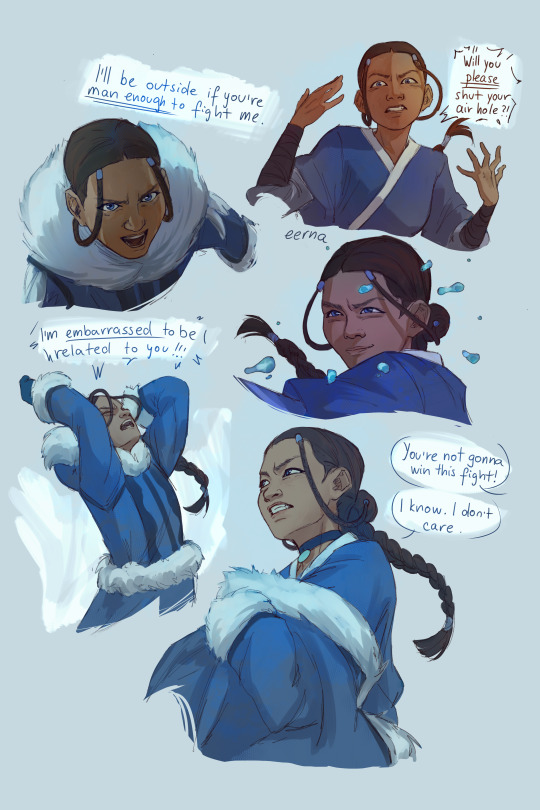
I love her bad temper and mean words <3<3 rip every spinoff and adaptation but I'm different
33K notes
·
View notes
Text
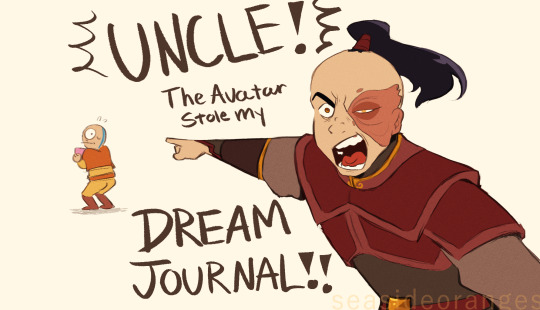

twitter // ko-fi
UNCLE send him to the principles office and have him EXPELLED!!!
20K notes
·
View notes
